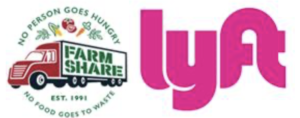
Farm Share, one of Florida’s leading food nonprofits, today announced a partnership with transportation network Lyft to increase the distribution of food and supplies to food-insecure South Floridians during the coronavirus pandemic.
The need for a transportation network partner surfaced after Farm Share was forced to revise many of its scheduled walk-up distributions to make them drive-thru only. The nonprofit determined that many Floridians, including seniors and those who travel by foot, were unable to access food at Farm Share’s drive-thru distributions due to a lack of transportation.
“The emergence of Floridians newly in need of support, coupled with the lack of funds and available volunteers, has caused us to act quickly and rethink how we serve Floridians,” said Stephen Shelley, Farm Share CEO. “Our new partnership with Lyft is vital, enabling us to directly connect Floridians with the food they need to feed their families.”
The partnership between Lyft and Farm Share is currently active in South Florida. It will provide hundreds of Florida families with a Lyft ride credit valued at up to $25, allowing them to get picked up and driven to a designated Farm Share facility. At the site, Farm Share team members place bags of fresh produce, frozen proteins, non-perishable goods, and bottled water into the trunks of the Lyft vehicles and recipients are driven home.
“We believe everyone should have access to reliable, affordable transportation. We are proud to work with Farm Share to help riders get to a location that provides them with free food and supplies,” said Yun Ling, General Manager for Lyft Florida. “These are challenging times for many families, and this partnership will help connect hundreds of people with the resources they need to get through this difficult time.”
This is one of many services that Lyft is providing to riders during the coronavirus pandemic. Across the United States, the transportation network is providing non-emergency transportation for those who need assistance acquiring prescriptions and getting to and from health care appointments.
Recipients are currently being identified at drive-thru distributions and through Farm Share’s agency partners in the region.
Note: Lyft drivers are instructed to pick up and drop only one rider per household. Limited supply. Limit one per household. Code redemption required. Offer valid for rides taken by April 30, 2020. Subject to Lyft’s Terms of Service.
“Farm Share is incredibly grateful for the support Lyft is providing, and we look forward to continuing to build strong relationships with corporate partners who share our goal of making sure that no Floridian goes hungry,” added Shelley.
About Farm Share
In 1991, food waste led to the creation of one of the nation’s most sustainable food charities, Farm Share. The organization’s founder, Patricia Robbins Alger, discovered that thousands of pounds of perfectly good fruits and vegetables were discarded daily by farmers and others because they weren’t “pretty” enough to sell commercially. Using the fresh produce for good, Farm Share began to distribute the food to agencies, soup kitchens, food banks, shelters, and churches at no cost, helping feed Florida’s most in-need residents.
Today, Farm Share is led by CEO Stephen Shelley, and it serves more than 2,000 partnering agencies and provides more than 88 million pounds of food annually – still at no cost – with the help of thousands of volunteers. Farm Share serves all 67 counties in Florida through its warehouses in Quincy, Jacksonville, Florida City, Homestead, and Pompano Beach. To learn more visit www.farmshare.org.
About Lyft
Lyft was founded in 2012 by Logan Green and John Zimmer to improve people’s lives with the world’s best transportation, and is available to 95 percent of the United States population as well as select cities in Canada. Lyft is committed to effecting positive change for our cities and making cities more livable for everyone through initiatives that bridge transportation gaps, and by promoting transportation equity through shared rides, bikeshare systems, electric scooters, and public transit partnerships.
